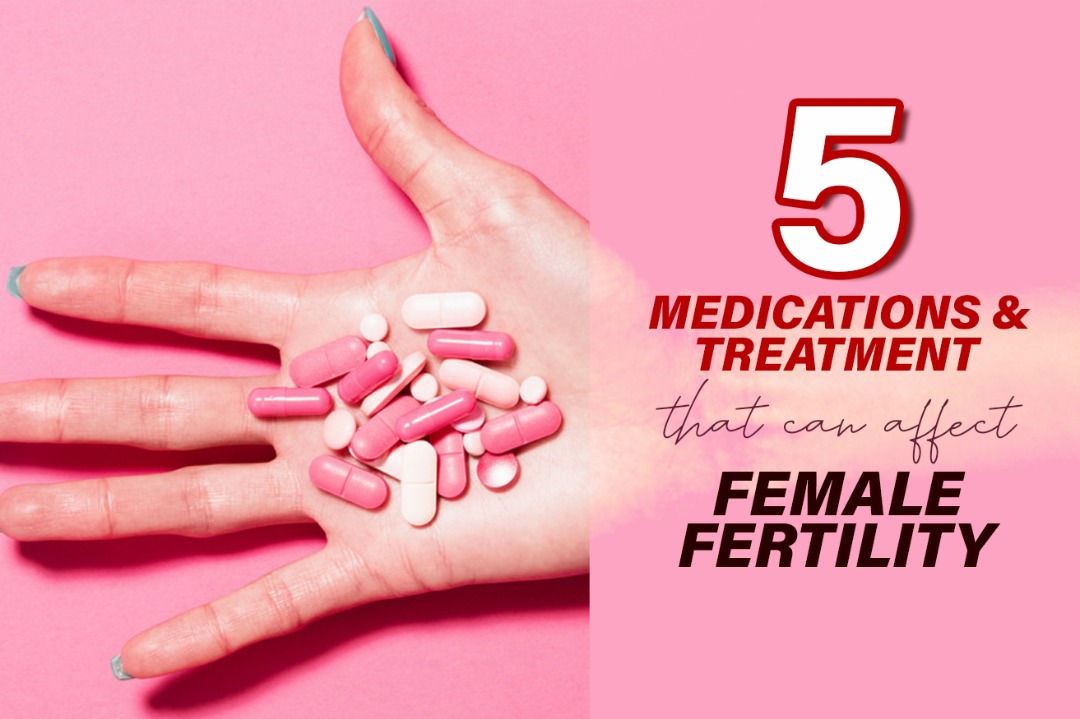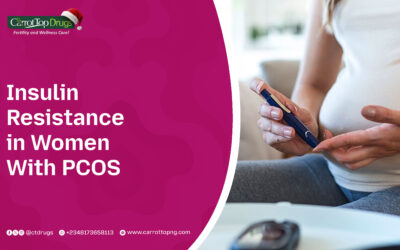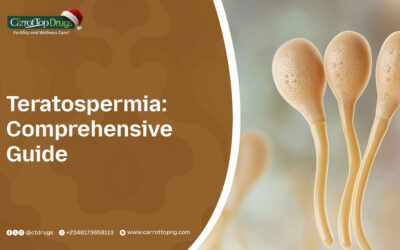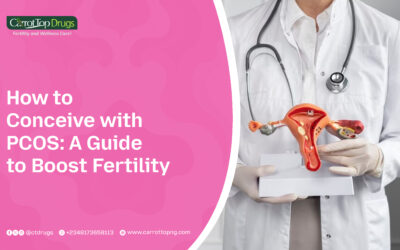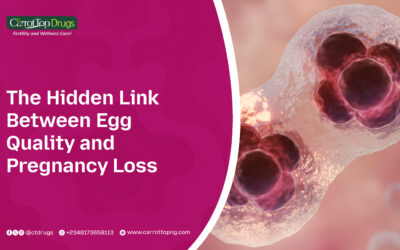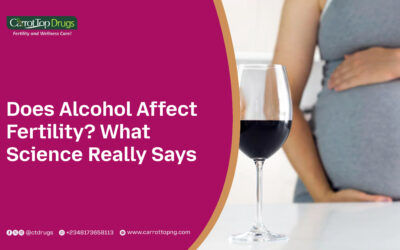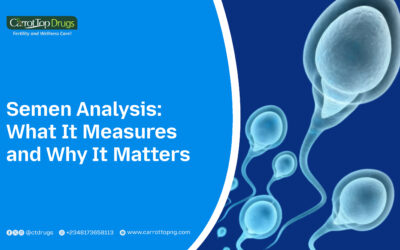Introduction
Fertility is a crucial aspect of reproductive health, and many factors can influence a woman’s ability to conceive. One often-overlooked factor is the impact of medications and medical treatments. Some drugs, whether prescribed for chronic conditions or short-term ailments, may disrupt hormonal balance, ovulation, or uterine health, reducing the chances of pregnancy. Additionally, certain medical treatments, including chemotherapy and long-term steroid use, can have profound effects on fertility. It is very important to understand how medications that can affect female fertility.</span>
Relevant Statistics
According to the Centers for Disease Control and Prevention (CDC), about 10% of women (6.1 million) in the United States struggle with infertility. Studies suggest that up to 15% of infertility cases are linked to medication use. Additionally, research indicates that over 30% of women of reproductive age take at least one prescription drug, highlighting the need for awareness regarding their effects on fertility.
Globally, infertility affects 1 in 6 couples, and medications are a contributing factor in many cases. A study published in the Journal of Clinical Endocrinology & Metabolism found that 12% of women who take prescription medications for more than five years experience some form of reproductive dysfunction. Furthermore, chemotherapy-related infertility is reported in over 40% of female cancer survivors, depending on the type and dosage of treatment. These statistics emphasize the importance of informed decision-making when it comes to medication use and reproductive planning.
7 Medications That Can Affect Female Fertility
1. Nonsteroidal Anti-Inflammatory Drugs (NSAIDs)
NSAIDs such as ibuprofen and naproxen are commonly used for pain relief and inflammation reduction. However, they are examples of medications that can affect female fertility. Their prolonged use can inhibit ovulation by interfering with the rupture of follicles, a crucial step in releasing an egg. Some studies suggest that NSAIDs can lead to luteinized unruptured follicle syndrome (LUFS), a condition that prevents egg release despite ovulation signs.
A study published in Human Reproduction found that women taking NSAIDs for more than ten consecutive days experienced a 75% reduction in ovulation rates. Though fertility usually returns after discontinuing NSAIDs, those actively trying to conceive should minimize their use.
2. Antidepressants
Another example of medications that can affect female fertility are antidepressants. Selective serotonin reuptake inhibitors (SSRIs) like fluoxetine and sertraline are used to treat depression and anxiety. While mental health management is vital, SSRIs may contribute to hormonal imbalances and disrupt ovulation. Some studies have linked antidepressants to irregular menstrual cycles and a lower chance of conception.
Additionally, antidepressants may increase levels of prolactin, a hormone that can suppress ovulation if elevated for extended periods. A study in Fertility and Sterility reported that women on SSRIs for over six months had a 20% lower conception rate compared to non-users.
3. Hormonal Contraceptives
Although birth control pills, patches, and injections are designed to prevent pregnancy, their long-term use can sometimes delay fertility recovery. Some women experience post-pill amenorrhea, where normal menstrual cycles take months to return. Additionally, progestin-only contraceptives may thin the uterine lining, making implantation difficult even after stopping the medication.
Research suggests that 50% of women conceive within three months of stopping birth control, while 10% may take over a year to restore full fertility. This delay is more pronounced in users of Depo-Provera, where ovulation may not resume for up to 18 months after the last injection.
4. Chemotherapy Drugs
Cancer treatments, particularly chemotherapy, can be highly toxic to the ovaries. These drugs may cause premature ovarian failure (POF), significantly reducing a woman’s egg reserve. Alkylating agents like cyclophosphamide and busulfan are known to have the most severe effects on fertility.
A study published in The Lancet Oncology found that nearly 70% of women receiving high-dose chemotherapy before the age of 40 experienced irreversible ovarian failure. Women undergoing chemotherapy are often advised to consider fertility preservation options, such as egg freezing, before starting treatment.
5. Steroids
Corticosteroids, used to treat inflammatory conditions like asthma and autoimmune diseases, can disrupt the hypothalamic-pituitary-ovarian (HPO) axis. Prolonged use may lead to irregular ovulation and menstrual disturbances, reducing fertility. Additionally, steroids can contribute to weight gain and insulin resistance, which are risk factors for infertility.
Long-term steroid therapy may also lead to diminished ovarian reserve, reducing the number of viable eggs. A study in Reproductive Biology and Endocrinology found that women using steroids for over a year had a 35% higher risk of anovulation compared to non-users.
6. Antipsychotic Medications
Certain antipsychotic drugs used to treat conditions such as schizophrenia and bipolar disorder can increase prolactin levels, which may suppress ovulation and cause menstrual irregularities. Drugs like haloperidol and risperidone are particularly known for this effect. Women on long-term antipsychotic therapy should monitor their reproductive health closely.
Long-term elevation of prolactin can lead to anovulation and decreased estrogen production, resulting in irregular or absent periods. This hormonal imbalance may also contribute to reduced bone density and increased risk of osteoporosis. Women who require antipsychotic medications should consult their healthcare provider about prolactin level monitoring and potential treatment adjustments to maintain reproductive health.
7. Anti-Epileptic Drugs (AEDs)
Medications used to treat epilepsy, such as valproate and carbamazepine, have been linked to polycystic ovary syndrome (PCOS) and irregular menstrual cycles. They are also examples of medications that can affect female fertility. Valproate, in particular, can lead to increased androgen levels, causing symptoms like acne, weight gain, and anovulation, all of which negatively impact fertility.
Additionally, AEDs can alter liver metabolism, affecting estrogen and progesterone levels. This disruption can interfere with ovulation and lead to decreased fertility rates. Women using AEDs should work with their neurologist and gynecologist to explore alternative medications with a lower impact on reproductive function.
Relevant Precautions
Women who are planning to conceive should take the following precautions when using medications:
- Consult a Healthcare Provider: Always discuss medication effects on fertility with a doctor, especially if planning pregnancy.
- Monitor Menstrual Cycle: Track ovulation patterns and cycle regularity to detect potential disruptions early.
- Seek Alternative Treatments: When possible, consider fertility-friendly medication alternatives with a healthcare provider’s guidance.
- Limit Long-Term Use: Avoid prolonged use of non-essential medications that could impact fertility.
- Consider Preconception Counseling: Women with chronic conditions requiring medication use should work with a reproductive specialist to create a fertility-friendly treatment plan.
Management Options
If a woman’s fertility has been affected by medication use, several management strategies can help:
- Discontinuing or Adjusting Medications: Under a doctor’s supervision, switching to a safer alternative may restore fertility.
- Fertility Preservation: Women undergoing chemotherapy or other high-risk treatments may opt for egg or embryo freezing before treatment.
- Lifestyle Modifications: Maintaining a balanced diet, exercising regularly, and managing stress can enhance fertility recovery.
- Fertility Treatments: If natural conception is challenging, ovulation-inducing drugs, intrauterine insemination (IUI), or in-vitro fertilization (IVF) may be recommended.
Conclusion
While medications are essential for managing various health conditions, some can negatively impact female fertility. Women who are planning pregnancy should be aware of these effects and take necessary precautions. Consulting with a healthcare provider, monitoring menstrual health, and considering fertility-preserving options can help minimize the risks. By staying informed, women can make proactive choices to safeguard their reproductive health.
FAQs
1. Can NSAIDs permanently affect fertility?
Long-term use of NSAIDs may impact ovulation, but fertility usually returns after discontinuing them.
2. How long should I wait after stopping birth control to conceive?
Most women regain fertility within 1-3 months, but for some, it may take up to a year.
3. Can antidepressants cause infertility?
Antidepressants can disrupt hormonal balance and ovulation, but effects vary by individual. Consulting a doctor for alternatives is recommended.
4. What are the best ways to preserve fertility before chemotherapy?
Egg freezing and embryo freezing are the most effective options for women undergoing chemotherapy.
5. How can I reverse steroid-induced infertility?
Discontinuing steroids under medical supervision and adopting a healthy lifestyle can help restore ovulation and fertility.
6. Can infertility caused by medications be treated?
Yes, depending on the cause. Treatment options include medication adjustments, lifestyle changes, and fertility treatments like IVF.
7. What should I do if I suspect my medication is affecting my fertility?
Consult your doctor immediately to explore alternatives or strategies to mitigate the effects on fertility.

